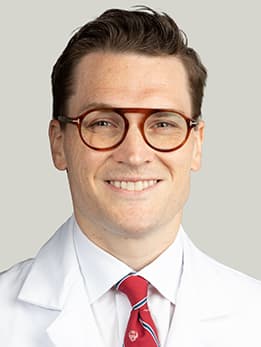
Sean P. Polster, MD
Sean P. Polster, MD
Assistant Professor of Neurological Surgery
Associate Director, Neurovascular Surgery Program
"Director, Skull Base and Neurovascular Laboratory "
Specialties
- Neurosurgery
- Neuro-Oncology (Brain & Spinal Tumors)
Locations
- Chicago - Hyde Park
- About
- Specialties & Areas of Expertise
- Locations & Patient Information
- Education & Research
- Accepted Insurance
- External Professional Relationships
Dr. Polster is a board-certified, fellowship-trained neurosurgeon who specializes in minimally invasive surgery of the brain and spine in both adults and children. Dr. Polster’s practice primarily focuses on treating neurovascular conditions of the head and neck as well as tumors of the brain and skull base. He is an expert in performing complex surgical procedures, including neurovascular surgery, endoscopic endonasal approach (EEA) neurosurgery, transorbital neuroendoscopic surgery (TONES) and open cranial neurosurgery are just some of the procedures. Dr. Polster and his clinical team have a robust infrastructure to help patients navigate their healthcare from diagnosis through follow-up. We work as a Center of Excellence in many disease processes and pride ourselves on delivering the very best information and treatment for patients.
As a physician-scientist, Dr. Polster is continuously researching new treatments and techniques to improve care for neurosurgery patients. As the endowed Safadi Faculty Scholar, the Polster laboratory is engaged in pre-clinical research and clinical trials to deliver the most cutting-edge treatments to patients. His work has been published in several, highly respected, peer-reviewed journals, such as Nature Communications, Neurosurgery, Stroke, JNS, Surgical Neurology International, Journal of Stroke & Cerebrovascular Diseases, Neurocritical Care, and more. He also has written numerous textbook chapters on the diagnosis and treatment of neurosurgical diseases.
Dr. Polster is not only committed to delivering the highest quality healthcare to his patients, but he is also invested in teaching and mentoring students and residents, providing guidance and instructions to help them navigate complex neurosurgery topics during their medical careers. Dr. Polster is the director of the skull base laboratory that is a joint effort with multiple surgical departments to teach and develop new surgical techniques and tools to treat diseases of the head and neck.
To learn more about Dr. Polster and his research lab, visit polsterlab.uchicago.edu
Contact Information:
Email: spolster@uchicago.edu
Areas of Expertise
- Arteriovenous Malformations (AVM)
- Carotid Artery Disease
- Carotid Endarterectomy
- Cavernous Angiomas
- Cerebral Aneurysms (Brain Aneurysms )
- Cerebral Cavernous Malformation (CCM)
- Chiari Malformation
- Hereditary Hemorrhagic Telangiectasia (HHT)
- Neurovascular Surgery
- Skull Base Tumors
- Stereotactic Radiosurgery
- Stroke
Board Certifications
- Neurological Surgery
Practicing Since
- 2013
Languages Spoken
- English
Medical Education
- University of Wisconsin- Madison, School of Medicine and Public Health
Residency
- University of Chicago - Neurological Surgery
Fellowship
- University of Pittsburgh Medical Center
Memberships & Medical Societies
- American Association of Neurological Surgeons
- American College of Surgeons
- American Heart Association
- Congress of Neurological Surgeons
- North American Skull Base Society
News & Research
Insurance
- Aetna Better Health *see insurance page
- Aetna HMO (specialists only)
- Aetna Medicare Advantage HMO & PPO
- Aetna POS
- Aetna PPO
- BCBS Blue Precision HMO (specialists only)
- BCBS HMO (HMOI) (specialists only)
- BCBS Medicare Advantage HMO & PPO
- BCBS PPO
- Cigna HMO
- Cigna POS
- Cigna PPO
- CountyCare *see insurance page
- Humana Medicare Advantage Choice PPO
- Humana Medicare Advantage Gold Choice PFFS
- Humana Medicare Advantage Gold Plus HMO
- Medicare
- Multiplan PPO
- PHCS PPO
- United Choice Plus POS/PPO
- United Choice HMO (specialists only)
- United Options (PPO)
- United Select (HMO & EPO) (specialists only)
- United W500 Emergent Wrap
- University of Chicago Health Plan (UCHP)
Our list of accepted insurance providers is subject to change at any time. You should contact your insurance company to confirm UChicago Medicine participates in their network before scheduling your appointment. If you have questions regarding your insurance benefits at UChicago Medicine, please contact our financial counseling team at OPSFinancialCounseling@uchospitals.edu.
Some of our physicians and health professionals collaborate with external pharmaceutical, medical device, or other medical related entities to develop new treatments and products to improve clinical outcomes for patients. In some instances, the physician has ownership interests in the external entity and/or is compensated for advising or speaking about the entity’s products or treatments. These payments may include compensation for consulting and speaking engagements, equity, and/or royalties for products invented by our physicians. To assure objectivity and integrity in patient care, UChicago Medicine requires all physicians and health professionals to report their relationships and financial interests with external entities on an annual basis. This information is used to review relationships and transactions that might give rise to potential financial conflicts of interest, and when considered to be significant a management plan to mitigate any biases is created.
If you are a patient at UChicago Medicine and would like more information about your physician’s external relationships, please talk with your physician. You may also visit the Centers for Medicare & Medicaid Services (CMS) Open Payments website at https://openpaymentsdata.cms.gov/ . CMS Open Payments is a national disclosure program that promotes a more transparent and accountable health care system. It houses a publicly accessible database of payments that reporting entities, including drug and medical device companies, make to covered recipients like physicians and hospitals.
Information in the CMS Open Payments database could potentially contain inaccurately reported and out of date payment information. All information is open to personal interpretation, if there are questions about the data, patients and their advocates should speak directly to their health care provider for a better understanding.
